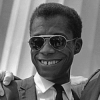James A. Baldwin

James A. Baldwin
James A. "Jim" Baldwinwas an American football player, track athlete, coach of football, basketball, and baseball, and college athletics administrator. He served as the head football coach at Rhode Island State College—now the University of Rhode Island, the University of Maine, Trinity College in Durham, North Carolina—now Duke University, Lehigh University, and Wake Forest University, compiling a career college football record of 41–32–14. Baldwin was also the head basketball coach at the same five schools, amassing a career college basketball...
NationalityAmerican
ProfessionAuthor
Date of Birth2 August 1924
CountryUnited States of America
James A. Baldwin quotes about
Voyagers discover that the world can never be larger than the person that is in the world; but it is impossible to foresee this, it is impossible to be warned.
One is responsible to life: It is the small beacon in that terrifying darkness from which we come and to which we shall return.
The price one pays for pursuing any profession, or calling, is an immediate knowledge of its ugly side.
Heredity provides for the modification of its own machinery.
The dualism itself becomes a sort of presupposition or datum; its terms condition the further problem.
Pythagoras took the next important step by subordinating the mere matter of nature to its essential principle of form and order, identifying the latter with reason or the soul.
Psychology more than any other science has had its pseudo-scientific no less than its scientific period.
Plato stands for the union of truth and goodness in the supreme idea of God.
In the first place, Descartes stands for the most explicit and uncompromising dualism between mind and matter.
In Socrates' thought the two marks of individual self-consciousness appear; it is practical and it is social.
Like all science, psychology is knowledge; and like science again, it is knowledge of a definite thing, the mind.
The development of the meaning attaching to the personal self, the conscious being, is the subject matter of the history of psychology.
The prehistorical and primitive period represents the true infancy of the mind.
The fact that tradition hinders the individual savage from thinking logically by no means proves that he cannot think logically.